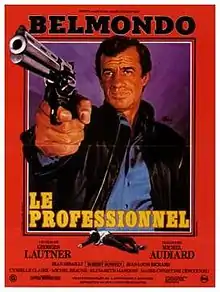| The Professional | |
|---|---|
 Film poster | |
| Directed by | Georges Lautner |
| Written by | |
| Based on | Death of a Thin-Skinned Animal 1976 novel by Patrick Alexander |
| Produced by | Alain Belmondo |
| Starring | Jean-Paul Belmondo |
| Cinematography | Henri Decaë |
| Edited by | Michelle David |
| Music by | Ennio Morricone |
Production company | |
| Distributed by | Gaumont |
Release date | 21 October 1981 |
Running time | 109 minutes |
| Country | France |
| Language | French |
| Budget | $3.5 million[1] |
| Box office | $63.4 million[1] |
The Professional (original title: Le Professionnel; French pronunciation: [lə pʁɔfɛsjɔˈnɛl]) is a 1981 French action thriller film directed by Georges Lautner. The film stars Jean-Paul Belmondo as the title role. The film is based on award-winning 1976 novel Death of a Thin-Skinned Animal by Patrick Alexander.[2][3][4][5][6]
The film was a commercial success upon its theatrical release and was the fourth most watched feature film in France in 1981 behind La Chèvre, Raiders of the Lost Ark and The Fox and the Hound, selling 5,243,559 tickets.[7]
The music was composed by Ennio Morricone, and the main theme "Chi Mai" became an instrumental hit and subsequent classic.
The famous final scene of the movie was made in Château de Maintenon.
Plot
French secret agent Josselin Beaumont is sent to kill Colonel Njala, the dictator of Malagawi, a fictional African country. However, before he manages to accomplish his mission, the political situation changes drastically and the French secret service resorts to handing over Beaumont to the Malagawian authorities. After a long, unfair trial, during which Beaumont is injected with drugs, he is sentenced to long-term penal servitude at a "re-education camp".
Following a daring escape with an African inmate, he returns to France and informs the French secret service of his presence, promising that he will kill Njala, who is in France for an official visit, thus getting his revenge on the people who betrayed him. The secret service responds by setting other agents on Beaumont's trail. However, he manages to remain one step ahead, humiliating and killing some of his major betrayers, including Rosen, the sadistic chief of the secret police. After Rosen falls in a gunfight, Beaumont takes Rosen's identity card and puts his dogtags on his body, spreading confusion within the secret service and temporarily reducing Njala's guard. Beaumont eventually tricks a secret service agent into shooting the dictator. While government officials confer with higher authorities, he slowly walks towards Njala's helicopter, but is shot dead by government agents, who have received the order to do so.
Cast
- Jean-Paul Belmondo as Josselin “Joss” Beaumont
- Robert Hossein as le commissaire Rosen
- Bernard-Pierre Donnadieu as l'inspecteur Farges
- Jean Desailly as le ministre
- Cyrielle Clair as Alice Ancelin
- Marie-Christine Descouard as Doris Frederiksen
- Elisabeth Margoni as Jeanne Beaumont
- Jean-Louis Richard as le colonel Martin
- Michel Beaune as le capitaine Valeras
- Pierre Saintons as le président N'Jala
- Pascal N'Zonzi as Arthur
- Gérard Darrieu as l'instructeur Picard
- Sidiki Bakaba as le prisonnier évadé
- Dany Kogan as sergent Gruber
- Marc Lamole as le serveur d'hôtel
- Radisa ''Steve'' Jovanovic as a policeman
Popularity in Eastern Europe
Because of the film's subject matter and the improving relations between France and the communist block at the time, the film had received a limited release in the Soviet Union and several other Soviet-alligned states like Poland, and received immense popularity there having become a household name there.[8][9]
See also
References
- 1 2 Jpbox-office.com Archived 2016-03-04 at the Wayback Machine
- ↑ Christensen, Elen (May 24, 2020). "French Movie Reviews: The Professional". Le Film Guide. Retrieved February 23, 2021.
- ↑ Powrie, Phil (1997). French Cinema in the 1980s. Clarendon Press. p. 141. ISBN 9780198711193. Retrieved February 23, 2021 – via Google Books.
- ↑ Craddock, Jim (2006). Videohound's Golden Movie Retriever. Cengage Gale. p. 501. ISBN 9780787689803. Retrieved February 23, 2021 – via Google Books.
- ↑ Bourlez, Fabrice; Vinciguerra, Lorenzo (2013). Pourparlers: Deleuze entre art et philosophie. Épure. p. 124. ISBN 9782915271607. Retrieved February 23, 2021 – via Google Books.
- ↑ Manila International Film Festival 1982. Office of Media Affairs. 1982. p. 5. Retrieved February 23, 2021 – via Google Books.
- ↑ Jpbox-office.com
- ↑ Yeremenko, E. D.; Proshkova, Z. V. (September 2020). "Foreign fi lms editing in USSR as cultural-historical phenomenon". Vestnik of Saint Petersburg State University of Culture (3 (44)): 28–34. doi:10.30725/2619-0303-2020-3-28-34.
- ↑ "Французский связной: история проката французского кино в России". Искусство кино (in Russian). Retrieved 2023-12-04.